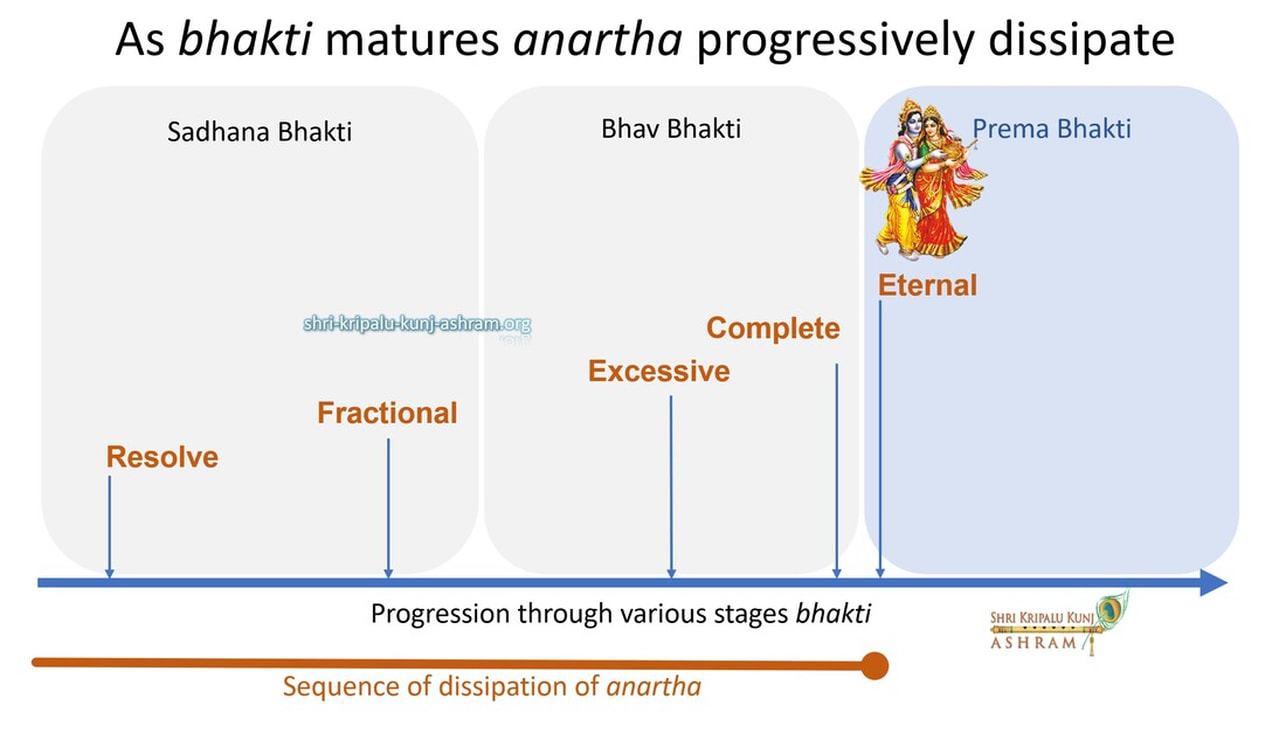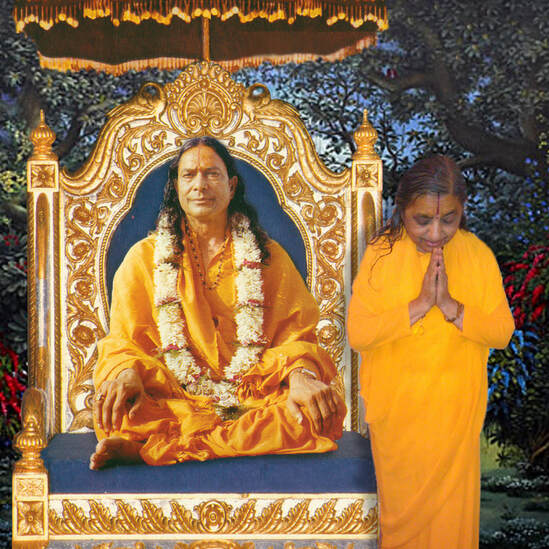Why Is My Devotion Not Increasing? |
 Worried about your devotion? Know your gotchas. Follow the remedy written by Shri Maharaj Ji.
Worried about your devotion? Know your gotchas. Follow the remedy written by Shri Maharaj Ji.
Question
I have been practicing devotion regularly and put in my best effort towards doing roopdhyan. Still, why is there no noticeable improvement in my devotion?
Answer
The word sadhana means to make a conscious, disciplined effort and practice to achieve a goal. The practice of devotion is called Sadhana bhakti. The sole purpose of Sadhana bhakti is to detach our mind from worldly matters and attach it fully and only to God. In scriptural terms it is called purification of mind. This world is insentient. It doesn’t have any bliss or sorrow so it can give neither bliss nor sorrow. However, being unaware of the true nature of the world due to one’s own fulfilled and unfulfilled expectations from the world one becomes miserable [1]. The fulfillment of desires leads to greed, while unfulfilled desires lead to anger, both of which ultimately make us miserable. God on the other hand is the unfathomable ocean of bliss. Hence attaching your mind to God, fills you (the soul called jeev) with unlimited bliss.
In other words, we need to practice devotion (sadhana) to detach our mind from the sansaar-The World and attach it to God. God and bliss are synonymous words. Jeev is sentient but a non-doer. Mind on the other hand is insentient, yet, by the power it gets from the jeev, it rules the senses[2][3]. So, our scriptures consider the insentient mind to be the doer. Since our mind is material, it has a natural affinity towards the material world. Therefore, it is essential to perform a two-fold practice
1. The practice of bhakti to increase our love for God [5][6],
2. Abstaining from those things that attract the mind towards material objects.
I have been practicing devotion regularly and put in my best effort towards doing roopdhyan. Still, why is there no noticeable improvement in my devotion?
Answer
The word sadhana means to make a conscious, disciplined effort and practice to achieve a goal. The practice of devotion is called Sadhana bhakti. The sole purpose of Sadhana bhakti is to detach our mind from worldly matters and attach it fully and only to God. In scriptural terms it is called purification of mind. This world is insentient. It doesn’t have any bliss or sorrow so it can give neither bliss nor sorrow. However, being unaware of the true nature of the world due to one’s own fulfilled and unfulfilled expectations from the world one becomes miserable [1]. The fulfillment of desires leads to greed, while unfulfilled desires lead to anger, both of which ultimately make us miserable. God on the other hand is the unfathomable ocean of bliss. Hence attaching your mind to God, fills you (the soul called jeev) with unlimited bliss.
In other words, we need to practice devotion (sadhana) to detach our mind from the sansaar-The World and attach it to God. God and bliss are synonymous words. Jeev is sentient but a non-doer. Mind on the other hand is insentient, yet, by the power it gets from the jeev, it rules the senses[2][3]. So, our scriptures consider the insentient mind to be the doer. Since our mind is material, it has a natural affinity towards the material world. Therefore, it is essential to perform a two-fold practice
1. The practice of bhakti to increase our love for God [5][6],
2. Abstaining from those things that attract the mind towards material objects.
This is no different from what we do in our everyday lives to heal. For example, while prescribing medicines and exercise regimen to a diabetes patient, the doctor also instructs them to exercise restraint in eating oily foods, sweets, and simple carbohydrates. Similarly, while practicing bhakti, our scriptures also prescribe being wary of things that draw us towards the material world.
So, what are those things that one needs to abstain from? This is the topic for the next section.
Offenses (Anarth)
Most people sharpen their focus on the practice of devotion but tend to ignore the importance of abstention [7]. Some abstentions are obvious and easy to follow, such as avoiding the company of non-believers, lying, stealing, etc. However, there are other offenses that seem minor but happen without our knowledge. These offenses are known as anarth and pose a significant hindrance in sadhana.
Anarth is classified primarily into the following four categories
Anarth is classified primarily into the following four categories
Performing Vedic rituals and adhering to the Varnashram dharma prescribed by the Vedas, gives rise to a feeling of virtuousness [8]. However, this feeling of virtuousness can lead to a desire for material rewards and celestial pleasures [4][8]. When the desire for rewards in terms of celestial opulence becomes the primary motivation for following the Vedic path, the purity and sincerity of one’s spiritual practice becomes compromised. Each and every hymn of the Vedas is meant to guide the aspirant only towards the Brahma-Supreme God. It is imperative to remain mindful of the purpose of Vedic teachings. The goal of observing Vedic precepts ought to be to cultivate a sense of inner peace and connection with the divine. Observance of Vedic precepts ought not be to seek external rewards or recognition.
So, performance of Vedic rituals hampers the progress of devotion. That is why these are called sukṛtajāta anartha (सुकृतजात अनर्थ) or "offenses due to good deeds".
So, performance of Vedic rituals hampers the progress of devotion. That is why these are called sukṛtajāta anartha (सुकृतजात अनर्थ) or "offenses due to good deeds".
Habits such as hurting others, indulging in substance abuse (intoxication), theft, and gambling are known as anarth caused by sinful actions or duṣkṛtajāta anartha. Though most will agree that these should be avoided [10], yet people do engage in such actions for personal gratification. Every spiritual aspirant must be extremely mindful of these habits as they can reduce the speed of your devotional progress.
Even the slightest of offense towards a devotee is known as aparādhajanya anartha. This results in drying up the sapling of love which might have sprouted. Engaging in actions such as insulting or underestimating a devotee, causing them mental or physical pain, and doubting the sincerity of their spiritual progress are all considered to be offenses against a devotee.
Shri Roop Goswami asserts -
Shri Roop Goswami asserts -
|
भावोऽप्यभावमायाति कृष्णप्रेष्ठापराधतः ।
|
bhāvo'pyabhāvamāyāti kṛṣṇapreṣṭhāparādhataḥ ।
|
“offense against a God-realized saint causes the spiritual downfall [11], even if the aspirant has reached the state of Bhav bhakti.”
Such offenses are spiritual transgressions and are unpardonable [12]. These include finding faults in your spiritual master or disrespecting him.
Such offenses are spiritual transgressions and are unpardonable [12]. These include finding faults in your spiritual master or disrespecting him.
|
विष्णुस्थाने कृतं पापं गुरुस्थाने प्रमुच्यते । गुरुस्थाने कृतं पापं बज्रलेपो भविष्यति ॥
|
viṣṇusthāne kṛtaṃ pāpaṃ gurusthāne pramucyate ।
gurusthāne kṛtaṃ pāpaṃ bajralepo bhaviṣyati ॥ |
“An offense against God could be pardoned by a saint but an offense against a God-realized saint or Guru is truly unpardonable”. Vedas do not prescribe any action to repent [13] for these transgressions either. One has to inevitably undergo the punishment of transgressing against a saint [12].
Being proud about one’s own minor devotional progress and considering others to be inferior is called bhaktijāta anartha. Such vanity erodes all devotional progress. For instance, for cleansing of the mind one has to shed tears of love and longing to meet the beloved. If while shedding tears of love, one makes a big show of it, instead of keeping it private, such behavior can result in losing all devotional progress made thus far. Scriptures' state -
|
गुहितस्य भवद् वृद्धिः, कीर्तितस्य भवेत् क्षयः॥
महाभारत |
guhitasya bhavad vṛddhiḥ, kīrtitasya bhavet kṣayaḥ॥
mahābhārata |
“As per the nature of divine love, it increases when concealed carefully and decreases if shown off”. If it is not concealed, then it increases pride which is the antithesis of God.
Jeev has been under the clutches of Maya for innumerable lifetimes. Therefore, out of ignorance jeev has been committing these offenses continually. Moreover, these offenses are so harmful. How does one stop doing these and help oneself? How do I improve my lot? This is a great question. Continue reading to know the answer.
As discussed earlier, the continuous practice of Sadhana bhakti while being mindful to abstain from aforementioned anarth, is the only remedy. Being mindful of these anarth is the first step.
Bhakti would gradually reduce all anarth. Other than performing sadhana diligently and regularly, no extra effort needs to be exerted. Just as the consumption of food automatically gives energy and satisfaction, the practice of devotion brings cognizance and detachment.
As the bhakti increases the tendency to engage in these anarth gradually dissipates [14]. This dissipation is called anarth-nivṛtti -
Bhakti would gradually reduce all anarth. Other than performing sadhana diligently and regularly, no extra effort needs to be exerted. Just as the consumption of food automatically gives energy and satisfaction, the practice of devotion brings cognizance and detachment.
As the bhakti increases the tendency to engage in these anarth gradually dissipates [14]. This dissipation is called anarth-nivṛtti -
1. Resolve (एकदेशवर्तनी अनर्थ-निवृत्ति)
Commencing sadhana with a firm resolve that the goal is to attach the mind to Shri Krishna. This is called ekadeśavartanī anartha-nivṛtti.
2. Fractional (बहुदेशवर्तिनी अनर्थ-निवृत्ति)
When one has some control on vices and can focus on God it is bahudeśavartinī anartha-nivṛtti. It happens at an advanced stage of Sadhana bhakti.
3. Excessive (प्रायिकी अनर्थ-निवृत्ति)
Having a good control over one’s vices is termed as prāyikī anartha-nivṛtti. It happens in the middle stage of Bhav bhakti when the mind gets well settled in meditation and most of the worldly attachments dissipate.
4. Complete (पूर्णा अनर्थ-निवृत्ति)
This also happens before God realization. In this state, almost all the worldly attachments are removed. In addition, all vices of Maya are also almost gone. This state is known as pūrṇā anartha-nivṛtti. It happens when the devotee reaches the apex of Bhav bhakti . Please know even at this stage, the veil of Maya is still there, hence a marginal chance of attachment could be expected.
5. Eternal (आत्यन्तिक अनर्थ निवृत्ति)
In this state all kinds of anarth are annihilated forever. In addition, the material mind which is the root of all anarth, gets transformed into a divine mind. Thus the root is also uprooted for good. This is called ātyantika anartha-nivṛtti. This state is attained after liberation from Maya and after God realization.
Commencing sadhana with a firm resolve that the goal is to attach the mind to Shri Krishna. This is called ekadeśavartanī anartha-nivṛtti.
2. Fractional (बहुदेशवर्तिनी अनर्थ-निवृत्ति)
When one has some control on vices and can focus on God it is bahudeśavartinī anartha-nivṛtti. It happens at an advanced stage of Sadhana bhakti.
3. Excessive (प्रायिकी अनर्थ-निवृत्ति)
Having a good control over one’s vices is termed as prāyikī anartha-nivṛtti. It happens in the middle stage of Bhav bhakti when the mind gets well settled in meditation and most of the worldly attachments dissipate.
4. Complete (पूर्णा अनर्थ-निवृत्ति)
This also happens before God realization. In this state, almost all the worldly attachments are removed. In addition, all vices of Maya are also almost gone. This state is known as pūrṇā anartha-nivṛtti. It happens when the devotee reaches the apex of Bhav bhakti . Please know even at this stage, the veil of Maya is still there, hence a marginal chance of attachment could be expected.
5. Eternal (आत्यन्तिक अनर्थ निवृत्ति)
In this state all kinds of anarth are annihilated forever. In addition, the material mind which is the root of all anarth, gets transformed into a divine mind. Thus the root is also uprooted for good. This is called ātyantika anartha-nivṛtti. This state is attained after liberation from Maya and after God realization.

So in a nutshell, bhakti alone is the remedy to attain eternal servitude of Shri Krishna [15] and become free from the miseries of the world.
So, the invariably precise medicine (amogh dava) [16] to alleviate all the pain and suffering is bhakti.
When you eat, with every morsel you feel fuller, satiated and gain strength. Similarly, when you do Sadhana bhakti all the attachment to worldly objects reduces [17], pain and suffering diminishes [18], and happiness increases [19]. When by the grace of Guru you reach Siddha bhakti all pain and suffering is gone forever and ever. This is called ātyantika anartha-nivṛtti (आत्यन्तिक अनर्थ निवृत्ति). There is absence of pain and in addition, you have attained God, the source of unsurpassable happiness.
To increase your devotion, do Sadhana bhakti and abstain from committing the anarth mentioned above. And one simple ‘do’ and one ‘don’t’ that makes all this happen is
Shri Maharaj Ji says, even while doing such a trivial action like scratching a mosquito bite, visualize that He is looking at you and smiling. While doing tamasi action (like sleeping), think He will come in your dream tonight that is why you are going to sleep. In this manner, force your mind into thinking about Him all the time. And by doing such a simple thing, you can attain the greatest bliss of all, and it will stay with you forever. Also, it will be ever new and will grow forever so you can never get bored of it.
So, the invariably precise medicine (amogh dava) [16] to alleviate all the pain and suffering is bhakti.
When you eat, with every morsel you feel fuller, satiated and gain strength. Similarly, when you do Sadhana bhakti all the attachment to worldly objects reduces [17], pain and suffering diminishes [18], and happiness increases [19]. When by the grace of Guru you reach Siddha bhakti all pain and suffering is gone forever and ever. This is called ātyantika anartha-nivṛtti (आत्यन्तिक अनर्थ निवृत्ति). There is absence of pain and in addition, you have attained God, the source of unsurpassable happiness.
To increase your devotion, do Sadhana bhakti and abstain from committing the anarth mentioned above. And one simple ‘do’ and one ‘don’t’ that makes all this happen is
- Always remember God
- Never forget God
Shri Maharaj Ji says, even while doing such a trivial action like scratching a mosquito bite, visualize that He is looking at you and smiling. While doing tamasi action (like sleeping), think He will come in your dream tonight that is why you are going to sleep. In this manner, force your mind into thinking about Him all the time. And by doing such a simple thing, you can attain the greatest bliss of all, and it will stay with you forever. Also, it will be ever new and will grow forever so you can never get bored of it.
Although our scriptures suggest many other expedients to realize God, but Shri Krishna clearly says –
|
न साधयति मां योगो न साङ्ख्यं धर्म उद्धव ।
न स्वाध्यायस्तपस्त्यागो यथा भक्तिर्ममोर्जिता ॥ भा 11.14.20 |
na sādhayati māṃ yogo na sāṅkhyaṃ dharma uddhava ।
na svādhyāyastapastyāgo yathā bhaktirmamorjitā ॥ bhā 11.14.20 |

“My dear Uddhava, the unalloyed devotional service rendered to Me by My devotees brings Me under their control. I cannot be thus controlled by those engaged in mystic yoga, Sāṅkhya philosophy, Vedas prescribed Vanashram dharma, Vedic study, austerity or renunciation.”
Yoga, Sāṅkhya , etc. might appear to be the means of God realization. However, none of them are the means to the ultimate goal of bhakti. When bhakti is not attainable by these means, then how can Shri Krishna be attained? Bhakti is not just capable of making one meet Shri Krishna, rather it captivates and controls Shri Krishna.
Yoga, Sāṅkhya , etc. might appear to be the means of God realization. However, none of them are the means to the ultimate goal of bhakti. When bhakti is not attainable by these means, then how can Shri Krishna be attained? Bhakti is not just capable of making one meet Shri Krishna, rather it captivates and controls Shri Krishna.
|
स्वल्पाऽपि रुचिरेव स्याद्भक्तितत्त्वावबोधिका । युक्तिस्तु केवला नैव यदस्या अप्रतिष्ठिता ॥
उज्जवल नीलमणी |
svalpā'pi rucireva syādbhaktitattvāvabodhikā । yuktistu kevalā naiva yadasyā apratiṣṭhitā ॥
ujjavala nīlamaṇī |
“Even the slightest interest or faith can sow the seed of bhakti. Whereas the aspects of bhakti cannot be assimilated by any trick (तरकीब) or insipid-mundane logic (तर्क). Because reasoning doesn’t bear the desired fruit. Real comprehension results in unflinching faith”.
The great scholars assert -
The great scholars assert -
|
येत्नेनापादितोऽयर्थः कुशलैर्नुमातृभिः । अभियुक्ततरैरन्यैरन्यथैवोपपाद्यते ।
|
yetnenāpādito'yarthaḥ kuśalairnumātṛbhiḥ । abhiyuktatarairanyairanyathaivopapādyate ।
|
“the most competent logicians prove a theory with great endeavor. In the future, the greater logicians disprove the previous one and establish another theory. Hence reasoning never lasts.”
To attain lasting fruits of bhakti
To attain lasting fruits of bhakti
|
सा भक्तिः साधनं भावः प्रेमा चेति त्रिधोदिता ।
भक्ति रसामृत सिन्धु 2.1 |
sā bhaktiḥ sādhanaṃ bhāvaḥ premā ceti tridhoditā ।
bhakti rasāmṛta sindhu 2.1 |
There are 3 kinds of Bhakti 1. Sadhana bhakti 2. Bhav bhakti 3. Prema Bhakti
Although three kinds of Bhakti are described by the great scholars-of-bhakti, according to Jeev Goswami Ji Maharaj, actually, there are only two kinds of bhakti - Sadhana bhakti and Sadhya bhakti. Sadhana bhakti is the devotional practice performed to cleanse the mind [1], whereas Sadhya bhakti (also called Siddha Bhakti) is given as a gift to a deserving jeev.
Although three kinds of Bhakti are described by the great scholars-of-bhakti, according to Jeev Goswami Ji Maharaj, actually, there are only two kinds of bhakti - Sadhana bhakti and Sadhya bhakti. Sadhana bhakti is the devotional practice performed to cleanse the mind [1], whereas Sadhya bhakti (also called Siddha Bhakti) is given as a gift to a deserving jeev.
Now, you must have understood -
In addition,
- your goal [20][21][22];
- the means to attain it [23];
- how to start the Sadhana - Daily Devotion;
- the milestones that inform if one is on the right path [24];
- the precautions to be taken while treading this path.
In addition,
|
कर्म प्रधान विश्व रचि राखा, जो जस करहि सो तस फल चाखा
|
karma pradhāna viśva raci rākhā, jo jasa karahi so tasa phala cākhā
|
“all living beings in human form [25] are free to perform any action they wish to [26][27], AND they are bound to reap the consequences of those actions [7].”
Shri Maharaj Ji spent 91 years teaching, guiding, instructing, ordering, imploring, and pleading with the jeev to take a keen interest in their own spiritual upliftment. As a preacher of Shri Maharaj Ji, Banchary Didi did the same for 76 years of her life. Shri Maharaj Ji spoke mainly in Hindi. Didi produced a lot of Shri Maharaj Ji’s philosophy in print primarily in English. This enables English speaking people all over the world to benefit from this abstruse and supremely beneficial philosophy.
On this site you can find
On this site you can find
- 60 Divya Sandesh,
- 108 Divya Ras Bindu and
- 48 reference articles on spiritual terms.
- descriptions of 36 festivals,
- 7 basic philosophy articles and
- blog entries of Didi's poetic compositions on Shri Maharaj Ji published in the last 13 years.
Please note that this is the last publication on this website. However, all of the publications continue to be freely available to assist you in your spiritual growth.
Vedas instruct us to
Vedas instruct us to
|
आवृत्ति रस्कृत उपदेशात
|
āvṛtti raskṛta upadeśāta
|
"Ponder repeatedly on the tattva gyan". Only then will it take root in the mind, thereby it will convert into actions.
Please use this invaluable treasure revealed by Shri Maharaj ji and compiled by Banchary Didi to learn tattva gyan related to pure bhakti. You are invited to refer back to these articles as needed and ponder over these topics to avail the maximum benefit.
Radhey Radhey to all readers for engaging in this spiritually uplifting material. It is now up to your free-will to use or not use this knowledge in your practical life.
Please use this invaluable treasure revealed by Shri Maharaj ji and compiled by Banchary Didi to learn tattva gyan related to pure bhakti. You are invited to refer back to these articles as needed and ponder over these topics to avail the maximum benefit.
Radhey Radhey to all readers for engaging in this spiritually uplifting material. It is now up to your free-will to use or not use this knowledge in your practical life.
Bibliography - Learn more
|
[2] Karmendriyan
|
[3] Gyanendriyan
|
|
[8] Deadliest Poison - Praise
|
[9] Upper Planets
|
|
[16] Why do only Bhakti?
|
[17] Bhakti Ends Misery
|
|
[20] Aim of Life
|
[21] Search for Happiness
|
|
[26] Who Builds Our Destiny?
|
[27] Destiny versus Actions
|
Some Pointers to Explore our Literature
Indulge yourself in spiritual material - Click on the images below or the headers
Divya Sandesh
|
Divya Ras Bindu
|
Spiritual Terms
|
|
We would love to hear from you. Please
|
To get notification about our publications please subscribe by entering the information above
|













